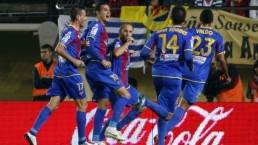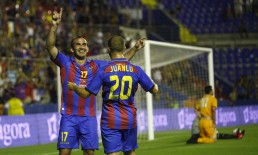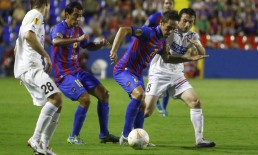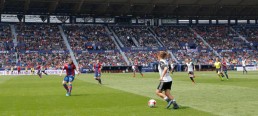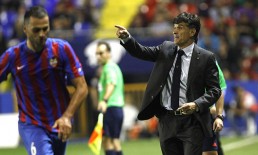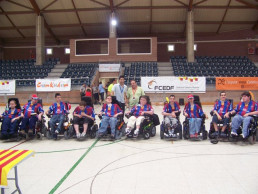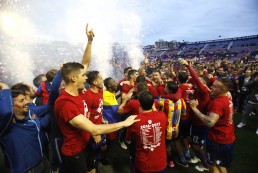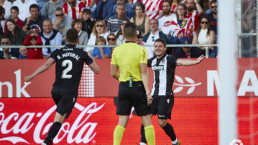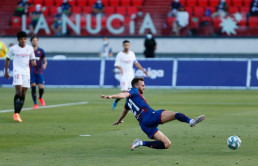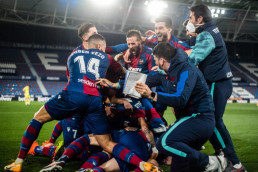The Granota players celebrate one of the goals scored against Villarreal.
The start of the 2011-2012 season, with Juan Ignacio Martínez on the bench, was superlative with Levante UD defending their leadership status after the notorious victories at Villarreal (0-3) and Real Sociedad (3-2). The Granota squad achieved seven consecutive victories. This good spell started in the Ciutat de València after subduing Real Madrid with a goal from Kone. The sun did not set either on the duels against Rayo Vallecano, Espanyol, Betis, Málaga, Villarreal and Real Sociedad. Levante completed their most distinguished season in its history after reaching sixth position in the Liga BBVA table.
Gekas scored the winning goal against Motherwell at the Ciutat
This achievement allowed Levante to cross the border of the Pyrenees to take part in the framework of the European League. However, they first had to beat Motherwell in a knockout round to qualify. This feat led to Levante taking its image and recording its name throughout Old Europe. Juan Ignacio’s squad visited Germany, the Netherlands and Sweden in the group stage to face Hannover 96, Twente and Helsingborg. As second classified, they crossed paths with Olympiakos, a Greek football legend, in the Round of 32 tie. The last stop saw Rubin Kazan as a rival.
Míchel and Pedro Ríos in one of the matches of the European League.
The complexity of this undertaking did not distract the team from the domestic competition. The atmosphere of the First Division recreated each of the steps of the group led by Juan Ignacio. The 2013-2014 season marked a change in Levante’s vital philosophy. Joaquín Caparrós, a coach with vast experience in the First Division, landed on the granota bench to seal another year in the top division. The summer of 2014 was marked by the transfer of Keylor to Real Madrid for a significant amount.
The Ciutat de València opened its doors to stage the women’s derby between Valencia and Levante.
The size of the leap in quality of women’s football in recent times is absolutely evident. Women’s football has reached the big stadiums. The Ciutat de València has not been immune to this explosion. It already hosted a final of the Copa de La Reina in the early years of the third millennium and served as the setting for the city’s women’s derby dispute between Levante and Valencia. It is starting to become a tradition. The professionalisation of the players, the strengthening of their internal structures, the arrival of sponsors, as well as the process of linking up with elite clubs in the Professional Football League, all determine the growth of the current Women’s football “Liga Iberdrola”, a framework in which Levante continues to be a reference club.
Mendilibar during his time in the ranks of Levante.
The club continued to grow internally and consolidate its structure, although the 2014-2015 financial year was complex from a sporting perspective. Mendilibar was the bet for Head Coach. However, on the eighth matchday he was relieved of his duties by Alcaraz. Levante suffered but managed to stay up. The summer period was difficult. Robert Sarver submitted an offer to purchase the Club but in the end the sale never took place.
The Levante of the third millennium is committed to sport as an integrating element.
The second decade of the third millennium confirmed the Levante’s desire to expand through the creation of different sports sections associated with its name. It was not a new phenomenon in history. Levante F.C. and Gimnástico F.C., in the twenties and thirties, strengthened their clubs with athletics, cycling or hockey teams that competed under their name. Levante UD supported the discipline of handball in the fifties. More recently, it all started in 2009 with the Levante Masclets playing electric wheelchair hockey. It was the seed that started Levante EDI. The Orriols institution was a pioneer with the inauguration of a football team for people with intellectual disabilities. Following this philosophy, the Levante PC team for young people with cerebral palsy emerged in 2016. The Di-Capacity Project revolves around David Casinos, Ricardo Ten, Mónica Merenciano and Óscar Ponce, four renowned Paralympic athletes of an indisputable level. There are more sports modalities. Levante Futsal (indoor football) competes in the elite league. The handball, foot-volleyball and beach soccer teams confirm this multifaceted tendency of the Levante UD Club.
The Levante squad celebrates their promotion to the First Division for the 2016-2017 season.
Levante returned to the Silver category at the end of the 2015-2016 financial year. After six consecutive seasons in the top league, the squad faced a new challenge; return as quickly as possible to the place they had lost. It was not just a simple thought. López Muñiz’s Levante crossed that threshold in a duel played at the Ciutat de València against Oviedo. There were six confrontations left for the final outcome of the 2016-2017 league competition. The return to the top league produced conflicting emotions. The landing of Paco López on the bench definitely illuminated the team’s path. Boateng symbolised the transition with a legendary hat-trick against F.C. Barcelona that broke Levante’s invulnerability and projected the Orriols team towards a superlative comeback.
Bardhi celebrates the final goal that conquered the fiefdom of Montilivi. Levante was still in the First Division.
The 2018-2019 season left a major appointment in the fiefdom of Montilivi. Levante played the season head or tail against Girona in a devastating match. The howitzer of Enis Bardhi certified a comeback of First Division (1-2). Earlier Morales had resolved an aerial action with a furious headbutt. The season concluded with the farewell of Pedro López after an extensive career as a Levantinista. The captain left after defending the elastic Granota for the last time against Atletico Madrid. That campaign the Levante Fútbol Sala played the final phase of the Spanish Cup as host when it was played in Valencia and agreed, for the first time, to the play-offs for the title. Levante Femenino was able to gather more than 20,000 souls in the derby against Valencia in the Ciutat.
Levante closed the 2019-2020 season playing at home at the Camilo Cano Olympic Stadium in La Nucia when the installation works of the roof of the Ciutat began.
The 2019 coronavirus marked the evolution of the 2019-2020 campaign. Suddenly, the world began to fade. Football suffered the effects of this annihilating plague. The competition suffered a parenthesis between the months of March and June. It was an atypical end with the calendar surpassing the month of July. The Granota squad concluded its league journey in La Nucia for the sake of the refurbishment works of the Ciutat. Levante signed its second best season in history in the elite. He won 49 points to fix his name to the twelfth position in the table. The Granotas obtained prestigious victories against Barcelona (3-1) and Madrid (1-0) in the Ciutat.
The Levante squad celebrates Roger’s goal that opened the doors of the Cup semifinals.
For a quarter of an hour Levante was finalist of the Copa del Rey. Everything was as brief as it was intense. In the second leg of the semifinals Roger mercilessly hit the goal of Athletic. However, the response of the Basque squad was exquisite, although the cupbearer dream was broken in a diabolical way after a shot by Berenguer that crashed into the body of Vukcevik to desnortar Aitor. The walk through the Cup ended in tragedy. It was the second time in history that Levante stepped on the threshold of the semifinals after the events of the 1934-1935 season with qualifiers full of magnitude against Valencia and Barcelona.
It was the season of silent stadiums. The effects of the pandemic kept fans away from the stands for almost the entire year. Campaña gained prominence when he debuted as an absolute international with Spain against Portugal emulating Dominguez. Levante remained upright in the top flight while the Futsal team brushed the glory of the league title. In the absence of 44 seconds the Levante sighted the championship. Barça forced extra time and lifted the title from the penalty spot. The Levante Femenino carried out a continuous exercise of overcoming to reach the finals of the Copa de la Reina and the Supercopa de España, although Atlético de Madrid and Barcelona annihilated the wishes of the players directed by María Pry.
